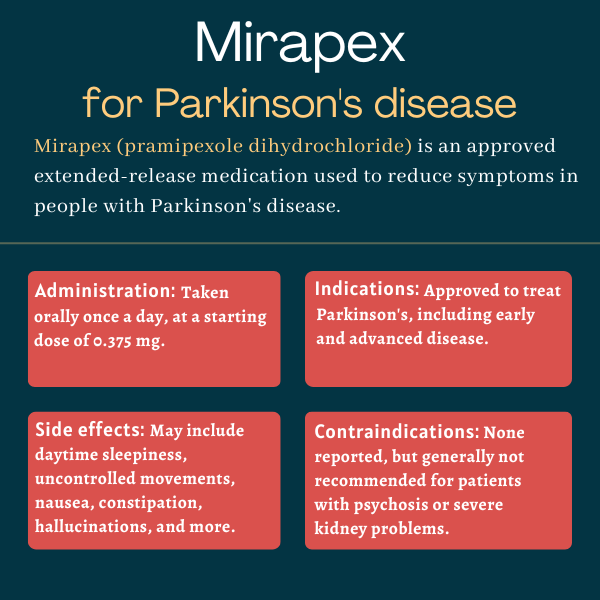FAQs about Mirapex
The U.S. Food and Drug Administration approved Mirapex ER in February 2010 for lessening signs and symptoms of early-stage Parkinson’s disease. That indication was then expanded to also include people with advanced disease. An earlier, immediate-release formulation of the therapy had been approved in 1997, but has since been discontinued.
Animal data has suggested that Mirapex ER may cause fetal harm. However, there are no clinical data on the medication’s effects on pregnant patients, so it is unclear whether the therapy is safe in this population. Patients should talk with their doctor about any plans for being pregnant while on Mirapex ER.
Some people on Mirapex ER may experience severe sleepiness or suddenly fall asleep during daily activities. Until patients know how the therapy affects them, those starting Mirapex ER are recommended to avoid driving or other activities that may be potentially dangerous if the individual becomes somnolent. If patients do experience such adverse events, they are advised to talk with their doctor.
In the trials that supported Mirapex ER’s approval, early Parkinson’s patients showed a significant reduction in motor impairment as early as 18 weeks, or about four months, after starting treatment. In advanced Parkinson’s patients, significant improvements in motor symptoms and daily off periods were seen as early as two and four weeks of treatment, respectively. However, each patient is unique, and as such, all are advised to talk with their healthcare team on how the therapy can help in their particular case.
While neither hair loss nor weight gain have been reported as side effects of Mirapex ER in clinical trials, some patients who received the drug or its older immediate-release formulation after their approval have experienced these effects. Also, weight loss has been reported in clinical trials of these formulations in early and advanced Parkinson’s patients. Patients should talk with their healthcare team if they experience any unanticipated effects of treatment.
Related Articles

 Fact-checked by
Fact-checked by 








